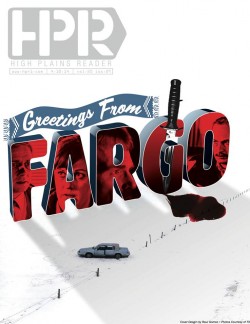Culture | April 10th, 2014

“Ah gee, I didn’t do nothin’. I just got home!” screams a nervous Lester Nygaard (played by Martin Freeman) in an episode of FX’s newest TV show, “Fargo.”An adaptation of the Coen brothers’ 1996 Oscar-winning feature film, “Fargo” the TV series will be just like the movie, except with a completely new set of engaging, peculiar and hysterical characters and events set in 2006.
“Oh yah. It’s real good,” says Bob Odenkirk’s confused and well-meaning cop character (and just about every character) at one point (in many points, actually) in the series. “You betcha.”
You’ll laugh, cringe, jump, shake your head, nod your head, compare old characters to new ones — you might even shout, “That’s not how we talk!” or, “We’re not that dumb!”
Yes, our Midwestern, Minnesota-nice reputation is now in the hands of Freeman, Odenkirk, Colin Hanks, Oliver Platt, Adam Goldberg, Kate Walsh, Tom Musgrave (a Minnesota State University Moorhead grad) and more incredible actors.
Geez. Is that a good thing?
Not to mention, these professionals are working with a very shrewd script. Keep an eye out for Billy Bob Thornton as Lorne Malvo: The manipulator. The brains. The invincible. The criminal.
Get hooked on “Fargo” starting April 15 at 9 p.m. on FX. The show will air every Tuesday night for 10 weeks. Locals can also catch the premiere for free at the Fargo Theatre. Cocktail hour starts at 8 p.m. and a Q&A with Musgrave will directly follow the program at 10 p.m.
High Plains Reader spoke with head writer/executive producer Noah Hawley over the phone as the crew was just four days away from wrapping up in Calgary, Alberta. He gave us detailed answers to our most burning questions.
High Plains Reader: The show is set in Bemidji, Minn., but was shot in Canada. Is the city of Fargo going to tie into the show in any way?
Noah Hawley: It does tie in.
The interesting thing about the movie is there is only one scene that takes place in Fargo and that’s the first scene and yet the movie is called “Fargo.” And so part of my thinking about making this was about, well why did they do that? Why call the movie “Fargo”?
Obviously, I think the word “Fargo” is evocative of a place. But it’s also interestingly, for my purposes, it’s kind of a metaphor for a certain type of true crime story, where truth is stranger than fiction, at least as far as the Coens designed it.
So Fargo exists for me as that metaphor, but we also do tie in specifically to the place and get to spend a little time there in the show.
HPR: How much influence do the Coen brothers have in the making of the “Fargo” TV show?
NH: Well, their influence is sort of in the genesis of the project. They made the movie, which created a world for American audiences, and around the world, of a certain view of what this region was like.
When I went to pitch this, what I would do, to FX, I said it’s the best of America versus the worst of America. Yes, we have problems, but look who’s solving them, which is what my takeaway was from the film.
Joel and Ethan, their involvement is mostly as supporters of my vision for the series, and certainly, I was nervous in sending them that first script and in sending them the cut of that first episode, but they’ve been nothing but supportive of what I’m trying to do.
But they also said very specifically, “TV is not our medium, and we like what you are doing and we want you to go off and make your show.”
I speak to them from time to time, but mostly in a sort of, I’ll call and say, “Oh yeah, so we got just two more episodes to go.” And they’ll say, “You’re still making that thing?” (Laughs). They’re fun guys, but I also know that they got a lot on their plates as well with their own work and that’s where their priorities are.
HPR: Any word on how many seasons “Fargo” will go?
NH: It’s interesting, I don’t have a sense of it yet. I think it’s designed as an anthology, which means that if we did do a second 10-hour movie, it wouldn’t necessarily be the same characters or even the same time period. It would just be another true crime story from the history of the region.
Because at the point at which the first season begins, the only thing it shares in common with the movie is the place and the certain type of storytelling, then I am free to reinvent it next year as another Coen brothers true crime story from the region that isn’t necessarily connected, literally, to the first season.
And I think for me, what made the movie so powerful and memorable is the fact that when Marge gets into bed in the end and goes to sleep after having seen probably the worse case of her life, she’s going to wake up tomorrow and is going to be “life is normal,” and that’s something we hold on to. … She stood up to the challenge and now her reward is she gets to go back to normal life.
So I just felt, conceptually, that if you make this the Coen brothers case-of-the-week show, you are going to end up making picket fences or something that doesn’t have the same sort of impact.
HPR: You’ve written for a number of other shows. But with “Fargo,” you’re dealing with such bizarre characters and dialogue that wouldn’t make sense in most other contexts. What are some of the challenges you’ve faced with writing the script of “Fargo”?
NH: Yeah, it’s interesting. Obviously, the Coens, you’re talking about two writers — every line from every movie is quotable, so that’s not intimidating at all.
But the thing that I really liked about the film “Fargo” was the fact that (the characters) just had an inability to communicate with each other — and that was sort of the root of a lot of their problems.
If Will Macy’s character (Jerry Lundegaard)had just asked his father-in-law for the money he needed — but he couldn’t even complete sentences, really, as a character. So it became very much, in the writing, of a disjointed style of dialogue. … Odenkirk’s character is a good example of someone who gets his point across, but in the least direct way possible.
And so the fun of it is, it’s the opposite of your normal challenges of a writer, which is to find the perfect words for things. Here, what you want to do is find the perfect word and then throw it in the trash and then figure out, I could say it with one word, but I am going to say it with 10 instead.
And that’s the fun of it as well. Obviously there is a certain language and vocabulary that people use that are not really common terms or ways of referring to things. And some of it, I had a writer on staff who has a lot of family in Minnesota and he introduced me to “uffda” and helped me with some of the local cuisine. But also, there’s a slightly dated quality to the language, but not to any specific period. It becomes just a sort of very regional and American kind of way of talking.
HPR: “Fargo” has an incredible cast. What kind of qualities were you looking for when selecting actors?
NH: Both I and the network, off of this first script, we had a real desire knowing that it was a limited series and we were only going to ask actors to commit to the one season — to cast it like a movie. ... And in a movie, all the supporting roles are played by feature actors. And so that was our goal, and we started out and once we landed Billy and then Martin, our phones started ringing. And so we got Colin Hanks and we got Mr. Odenkirk, Oliver Platt came on board … and suddenly there were no small roles.
And that’s what was incredible about it, and I feel like you see it on the screen. Actors who’ve acted in features know what it is like to have a closeup that is actually 30 feet wide and the power of small things, whereas television is usually a little more melodramatic than that. So it’s been really powerful to have actors of Billy’s caliber or Martin’s caliber. They are just simple in a way that’s really profound — and very funny.
HPR: Yeah, I don’t think many of us would have guessed this British “Lord of the Rings” character could nail a part like this.
NH: (Laughs) Yeah, I know, but I was thinking of the Martin from the original “Office” and “Sherlock” as well. You see him with Benedict Cumberbatch and you think this is a guy who puts up with a lot.
And the interesting thing that Joel and Ethan have said about polite societies, they are often the most violent, because people don’t know how to bend, they only snap.
So, I like that idea of taking Martin, who we’ve seen in these places before, and just how far do you have to push him before he snaps.
HPR: Can you give away any juicy secrets or factoids about the show to us Fargoans?
NH: Well, I guess I would say, in a lot of ways the movie created such a mystique about the region, but it’s a shame it’s taken 25 years to get back to that place and that tone of voice, which I feel is very much of the region.
You know, even if you look at “Prairie Home Companion,” there is a sense of humor and a stoic grace to the region that, so when I said it’s the best of the America versus the worst of America, I really meant it’s about a place where no one is putting their pride ahead of their neighbors. And everybody has a very sort of self-deprecating sense of humor. And that is always interesting to me. I’m not a huge fan of melodrama, and I’ve never seen a Coen brothers — it’s like they never manipulate you to feel a specific emotion. They just tell you what happens.
I think the idea that Fargo is a state of mind is definitely a part of what we are saying to people. It’s not like any other place.
HPR: This question is for you, specifically: Before becoming a screenwriter, what led you to believe that you were capable of such a position?
NH: I started as a songwriter and I became a novelist. And what I’ve found as a screenwriter that really helps me is that screenwriting is basically novel writing but with economy. You have 100,000 words to say something in a novel — you’ve got to figure out how to say it in five.
It’s about being a visual writer. And it’s about knowing when to get in and get out of scenes and having an instinct, I think, for what the heart of scene is, because you don’t have a lot of time as a screenwriter to explore the color of the sky.
It’s really about, what is the scene about and how can I convey that in as a brief a way as possible with the most impact as possible. But that also applies to the comedy of it as well. Sometime a scene exists for other reasons than pushing the plot forward, which is certainly the case in “Fargo.”
But my motto is, what else can I get away with? And so they let me write books. And then I think, hey, will they let me write movies? Well, hey, can I write television? I just keep pushing.
May 12th 2025
May 12th 2025
July 15th 2025
July 3rd 2025
May 19th 2025
__293px-wide.jpg)

__293px-wide.jpg)


_(1)__293px-wide.jpg)